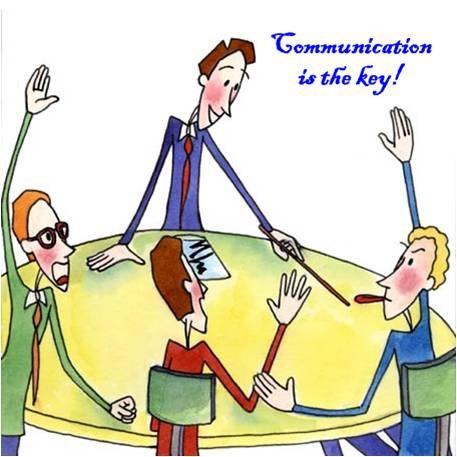1670
How to improve communication skills

1. Do not take the reaction of anger or a person on his account, even if they are, it would seem, is angry at you. It is most likely in fear or dissatisfaction than you personally. Take a deep breath and count to ten. Let this be a time for your interlocutor to speak, before he can say that he is really on his mind.
2. You do not have to know all the answers. Perfectly okay to say, "I do not know." If you want to know something extra, tell me about it, find and share the results. Or maybe you do decide to work with his companion together to find an answer to his question.
3. Answer (facts and feelings), and does not respond (only feelings): For example: "Please tell us more about what you care about," or, "I understand your concern," instead of, "Look, I'm just doing my work! "or" It's none of my business! "(this phrase just cause even more irritation). Share the responsibility for the outcome of any communication, in which you participate, and understand that sometimes (and perhaps even often), your personal reaction can cause all the problems in communication.
4. clarify this fact: people are not so important that you agreed to them more important that you heard them. It's amazing how many people complain that they do not hear, but did not listen to yourself! You can show that you hear his companion, with him all his attention and saying phrases like:
5. "Please tell us more about what's bothering you»
"What is it about ... causes your fears?»
"What you say is of interest. Can you share what led you to that opinion? »
"What we need to do to condition ... it was more acceptable for you?»
Remember that what someone says and what we hear at this time, can not quite match. Our personal filters, beliefs, and judgments can distort said. Repeat the phrase or briefly summarize it, to make sure you understood everything correctly. Teach that you think you heard, and said, "I understand you correctly?" If you feel that you perceive emotionally said something, tell about it, and ask questions like, "Maybe I understand you are not quite right, and received information on your account. I thought you said ...; this is really what you mean? »
6. Accept inconvenience or dissatisfaction with the interlocutor, and offer concrete terms, especially if your actions may hinder their work, or do you need someone to help you in resolving the issue. For example, if you need to update your system on someone's computer to gain access to someone else's office, you can say, "I understand frustrating when someone in your office at this time, and I thank you for your assistance. It is necessary to keep your system running smoothly. I plan to start at three o'clock and finish close to five in the evening. " Next: Do not give advice unless you are asked to. It can be tricky, especially if you have an experience that seems to you can help someone. Use respectful wording such as: "One of the options ..." or "In a similar situation helped me ... I am pleased to share with you the experience, if you think you it may be useful" instead of "you have to do something and then -So! »
7. Look for common ground, not to cling to the differences. What may be of interest to both sides of the conversation? For example, in conjunction with no failures. One way to find a common interest - to share their purpose - for example: "I share this to help you to make this project a success».
8. Remember that the changes are stressful for most people, especially if your actions affect them so that they can not provide it or to change it. Routine actions can reassure us among seemingly chaotic world. Thus, if you are on someone else's site, or you need a person to do something when it is convenient to you, give him as much information about what you need and in what time frame. If you can, tell you what benefits it will bring to him.
9. Try to keep a positive attitude. We always have a choice in how we relate to a particular circumstance. People who are considered skillful and successful (including professional athletes and famous cultural figures) are working on a positive attitude. To maintain this attitude, ask yourself, "What's so cool?" Or "What can I learn from this?" Do not forget about those anti-stress techniques that help you best.
10. Do not forget that the idea most people (including you) is unique and self-centered. This, in general, good, because it helps us achieve our objectives and to defend himself. Do not assume that someone will know or share your personal agenda - so the best way to establish a useful dialogue - to talk about what is most important to you, and ask about what is most important to your interlocutor.
11. Try to be a good listener. People think that really listen to something they know well, but in fact most do not listen and do not hear at all. They just say, and then think that they will say next. Good listener asks good questions, drives away distracting thoughts (eg, about whom he will meet or what he was going to say). When the interviewee makes caustic comments or complains it can often be a sign of fear or problem. Behave like a detective: ask questions that penetrate into the essence of design interlocutor. And only then you can get a really useful dialogue meaningful.
























